Can Token Projects on Different Blockchains Interact with Each Other?
This article aims to delve into the complexities of token interoperability, exploring the challenges, solutions, benefits, and future outlook of cross-chain interaction.
Share this Post to earn Money ( Upto ₹100 per 1000 Views )

Introduction:
In today's rapidly evolving blockchain landscape, one of the fundamental questions that arise is whether crypto token projects on different blockchains can interact seamlessly with each other. This article aims to delve into the complexities of token interoperability, exploring the challenges, solutions, benefits, and future outlook of cross-chain interaction.
Token interoperability is like different languages being able to understand each other. In the world of blockchains, it's about tokens (like digital assets or currencies) from different blockchain networks being able to talk to each other and trade smoothly. Unlike regular systems where it's easier for different parts to connect, blockchains are more complicated because they're decentralized and have their own rules and setups.
Understanding Blockchain Networks
Different blockchain networks, such as Ethereum, Bitcoin, Polkadot, and Cosmos, each have their own rules and special features. For example, Ethereum is famous for its smart contracts that power decentralized finance, while Bitcoin is mainly used for storing value and making direct transactions. Because these blockchains have their own unique setups, it's tough for them to work together smoothly.
Challenges pop up when trying to make tokens that are developed by token development companies from different blockchains talk to each other. One big problem is that there aren't standard rules that all blockchains follow. Each one does its own thing, which makes it hard for tokens to move between them easily. Plus, there are technical issues, like different ways they handle data and make decisions, which make it even trickier.
But there are ways to solve these problems. One solution is using what's called cross-chain bridges. These are like connectors that help tokens that are developed by crypto token development companies move between different blockchains without getting stuck. They use clever methods like atomic swaps (where tokens are traded directly between blockchains) and wrapped tokens (which represent tokens from one blockchain on another).
Another fix comes in the form of interoperability protocols, like Polkadot's Substrate and Cosmos' Inter-Blockchain Communication (IBC) protocol. These protocols give a framework for building apps that can work across different blockchains. They set up rules for how blockchains should talk to each other and share information.
Token interoperability offers several benefits:
Enhanced Liquidity: With token interoperability, assets can move smoothly between different blockchain networks. This fluidity boosts liquidity in the market, leading to better price discovery and increased efficiency in trading.
Improved Accessibility: Interoperable tokens make financial services more accessible to users. They can access a broader range of decentralized applications and services without being limited by the boundaries of a single network. This accessibility promotes financial inclusion, allowing more people to participate in the decentralized economy.
Future trends in token interoperability are pointing towards the following:
Standardized Protocols and Scalable Infrastructure: The future of token interoperability hinges on the establishment of standardized protocols and the development of scalable infrastructure. Leading projects like Polkadot, Cosmos, and Ethereum 2.0 are pioneering efforts to enhance cross-chain interoperability solutions.
Innovative Developments: As blockchain technology continues to advance, we anticipate seeing innovative developments in cross-chain interoperability. Examples include the emergence of decentralized bridges, trustless atomic swaps, and the standardization of cross-chain smart contracts. These innovations will drive further adoption of interoperable solutions across diverse industries.
Conclusion:
Projects related to token development on various blockchains can effectively interact through interoperability solutions. Despite challenges like standardization issues and technical complexities, ongoing initiatives by platforms such as Polkadot, Cosmos, and Ethereum 2.0 are facilitating a more interconnected blockchain ecosystem. Partnering with a crypto token development company that offers crypto token development services will enhance the crypto projects

 Elsamarie
Elsamarie 












